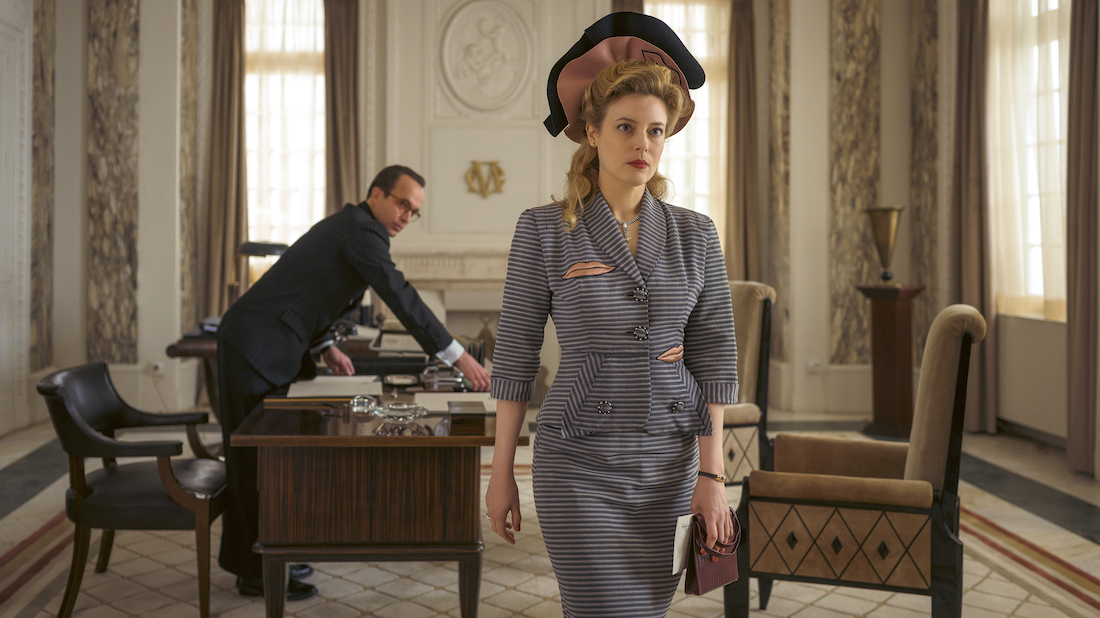Tales of heroism set during World War II are a dime a dozen—typically mud-soaked soldiers on valiant missions behind enemy lines, shooting at Nazis with blood-soaked gusto. “Transatlantic,” Anna Winger’s new limited series for Netflix, reminds us that heroes weren’t always forged behind the barrel of a gun. Sometimes, they were ordinary civilians, using what privilege they had to save not just the people hunted by the Third Reich but the culture they wanted to eradicate from the face of the Earth.
In Winger’s (and co-creator Daniel Handler’s) case, the heroes highlighted are the ad-hoc Emergency Rescue Committee founders, who successfully smuggled 2,000 of Europe’s foremost artists, thinkers, and academics to safety in America through the risky ports of Marseille in 1940. The US is still clinging to a thin veneer of neutrality, turning away refugees by the hundreds while plugging their ears and humming while the Third Reich spreads throughout Vichy, France. Meanwhile, the stalwart founders of the ERC—including former journalist Varian Fry (Cory Michael Smith) and principled Chicago heiress Mary Jayne Gold (Gillian Jacobs)—burn up what political and financial capital they have left to get luminaries like Hannah Arendt, Walter Benjamin, and Walter Mehring out of the country before the Nazis can find them.
While that sounds like a recipe for melancholic intrigue, “Transatlantic” has a bittersweet, Classic Hollywood vibe, evoking the historical romance of “Casablanca” in its lush, vibrant presentation. When it’s not playing with surrealism and German Expressionism in its fragmented, black-and-white intros and credit sequences, father-son cinematographers Wolfgang and Sebastian Thaler soaks 1940 Marseille in crisp, saturated colors, bouncing off Justine Seymour’s vivid costumes and the ornate decoration of the Villa Air-Bel. This ramshackle mansion eventually becomes the ERC’s waystation for its rogue’s gallery of big thinkers.

And to its credit, this surprising sunniness brings a welcome sense of relief to much of the show’s darker material. While these are grim times, we’re not following grim people: These are idealists, hoping (perhaps naively) to preserve what they feel is most important—the art and philosophy that elevates a society beyond mere survival. And as they await the next phase of their exodus from peril, the idiosyncratic group of refugees finds the time to sing, dance, and fall in love in the sun-dappled oasis of the Villa Air-Bel. These moments help save “Transatlantic” from becoming a stew of genocidal misery.
But at the same time, Winger and Handler (following the template laid out in Julie Orringer’s novel The Flight Portfolio, from which this is a loose adaptation) struggle to balance that tone with the innate seriousness of the proceedings, and its seven short episodes occasionally spread themselves too thin. In addition to Fry and Gold’s broader efforts, we must also zero in on their personal struggles—Fry’s secret love affair with fellow volunteer Thomas (Amit Rahav), Gold’s negotiations with blinkered American Consul Graham Patterson (Corey Stoll, delightfully droll), and so on. On top of that, many freedom fighters are taking more direct, violent action to contrast with the ERC’s more humanitarian efforts, including African immigrants (like Ralph Amoussou’s bellboy Paul Kandjo) looking to defend themselves from another, the more potent flavor of subjugation. Add to that Patterson’s own politicking with French police lieutenants and the push and pull between passive and active resistance among a host of other characters, and “Transatlantic” finds itself with little room to flesh all these threads out as complexly as it should.
Such hastily-juggled storylines and tones make the whole thing feel incomplete, especially considering the deliberately meandering pace the seven episodes go for. Sure, it’s fun to watch Mary Jayne bedazzle unsuspecting marks with her classical good looks and her disarming little pooch Dagobert, or Walter Mehring drunkenly improvise a satirical song ragging on Hitler while jumping from hotel bed to hotel bed. But these moments often undercut the broader air of menace that hangs over the characters, especially when it begins costing lives. One episode centers almost entirely around a droll, surrealistic birthday party for painter Max Ernst, which is diverting enough before you realize these people should be fearing for their lives.

Then again, that’s the bittersweet appeal of “Transatlantic,” a show about people desperately clinging to some sense of normalcy in a world slowly trying to eliminate them. Villa Air-Bel becomes a liminal space between imprisonment and freedom, the rare place these abject artists, Jews, and homosexuals can truly be themselves. They rage against the dying of the light, partying their hearts out because, at some point, jackboots will come marching down their street. With the threat of Nazi extermination so close behind you, do you focus all your energies on survival? Or do you try to make what could be your remaining days as full of love and life as possible? “I thought that we would live here forever,” Fry sighs to Thomas of the villa late in the series. Thomas’ response? “For a moment, so did I.”
When “Transatlantic” relishes in these moments of poignancy, it approaches the complexity that made Winger’s previous Netflix hit, “Unorthodox,” so successful. The performances are game—Jacobs’ alluringly contemporary performance earmarks just how out of place this Chicago dilettante is in the world of spycraft, and Smith’s Fry is appropriately conflicted between his duty to his mission and the forbidden love he’s found in Marseille. But the series sacrifices a bit of depth in exchange for accessibility, keeping its famous players at arm’s length and speedrunning through the honorable work the ERC did in real life. They’re ultimately small complaints; the series is entertaining and digestible in its own right. But it’s frustrating to see how those small tweaks could have elevated this show to true greatness.
All of season one was screened for review. “Transatlantic” is now playing on Netflix.












